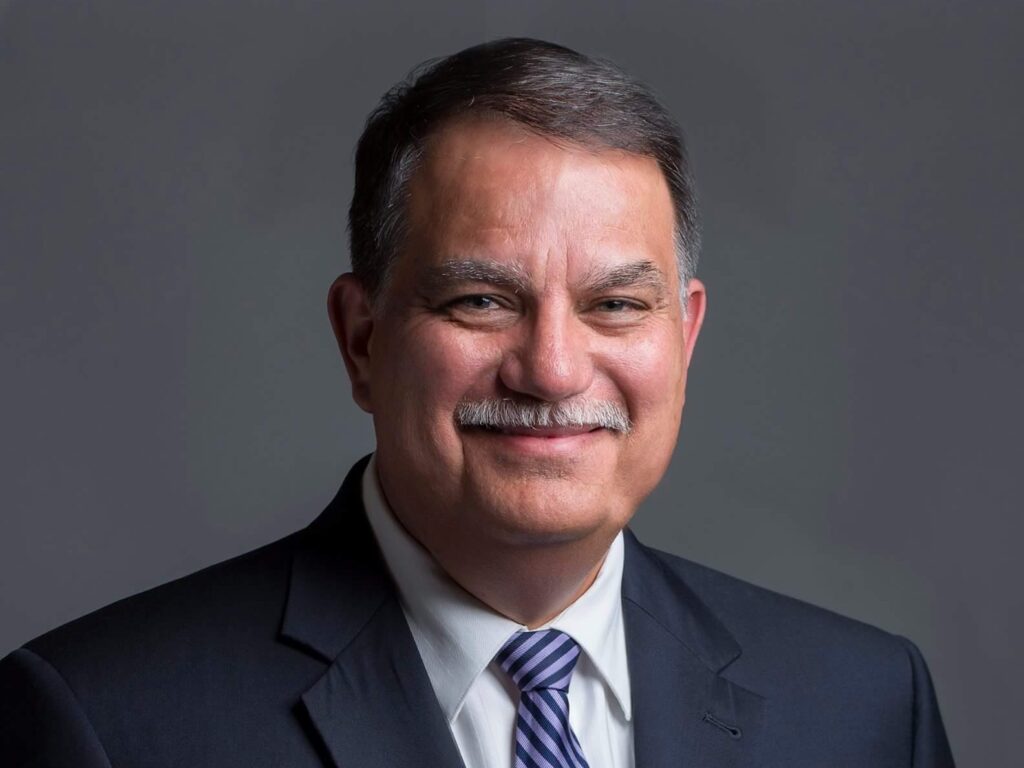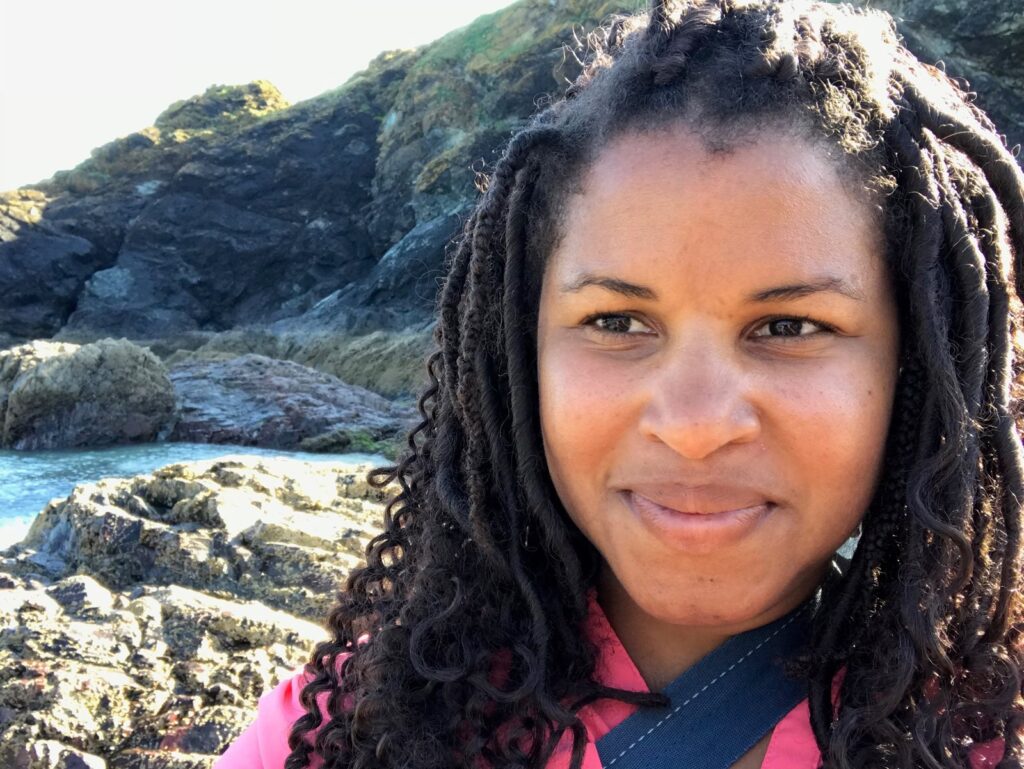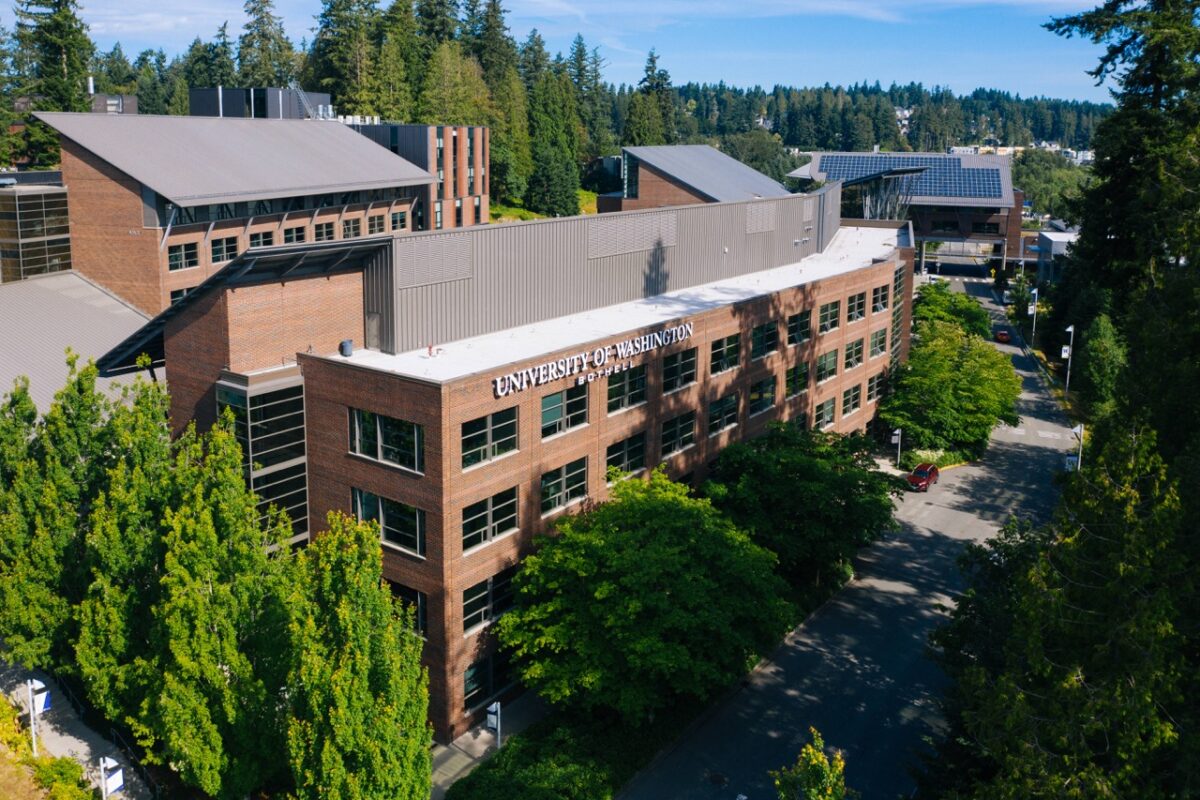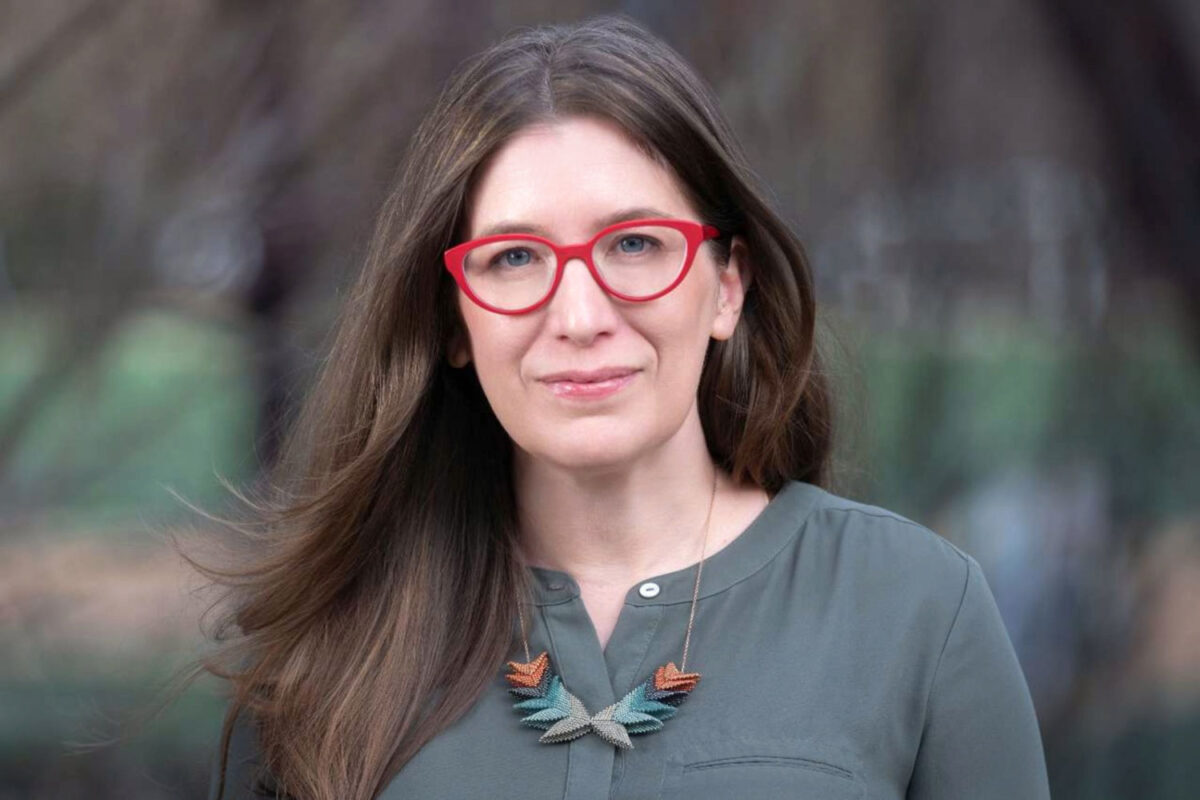Sustainability has been a core value for the University of Washington Bothell since the very first classes were held in 1990. And over the years this has taken many forms, inside and outside the classroom.
Indeed, as an institution, the University ambitiously defines sustainability as the “capacity and commitment to create and maintain healthy, equitable and diverse communities now and into the future.”
For their work in support of these aspiration, both Tony Guerrero, associate vice chancellor for Facilities Services & Campus Operations, and Dr. Melanie Malone, assistant professor in the School of Interdisciplinary Arts & Sciences, were honored with a 2023 Husky Sustainability Award.
Recipients of this prestigious award, which celebrates the exemplary achievements of an individual or team from the UW community demonstrating leadership, initiative and dedication to campus sustainability, are chosen by the UW Environmental Stewardship Committee.
Legacy award for sustained efforts
Guerrero’s passion for environmental sustainability began with a paperback book called “Worms Eat My Garbage” by Mary Applehof. It contains a definitive guide to vermicomposting — a process using red worms to recycle human food waste into nutrient-rich fertilizer for plants.
When Guerrero picked up the book in 1989 while he was a maintenance supervisor for the Kingdome in Seattle, he never imagined the domino effect it would set off, ultimately leading him to his current role at UW Bothell. He has now worked in FSCO for more than 20 years and has been a driving force behind the campus’s sustainability initiatives.
And of course, the very first project Guerrero started when he was hired by UW Bothell in 2003 was to start vermicomposting, a process that, to his wife’s initial dismay, he had already mastered at home. “I brought a big tub of red wiggler worms from my house and started the process on campus,” he said. “We went around and collected watermelon rinds, banana peels and old fruit and mixed it all up to feed the worms. At first, we built four bins for the worms, then four turned to eight and eight into 16.”
It wasn’t long before people in the greater Bothell area heard of his efforts and wanted to start wrangling their own wigglers. “We started hosting tours for elementary schools, and I would even meet teachers at Starbucks and provide them with worms,” he laughed. “We got about 15 different schools to start vermicomposting, which is pretty great.”
Guerrero soon advanced from worms to something less slimy and more furry. “I heard about goats eating weeds in Oregon, and I thought, ‘Hey, we could do that here.’”
From worms to goats

Goats provided an efficient, green solution, and they were ideal for working on the campus’ hilly terrain. “It just seemed to be a win-win situation to hire the goats,” Guerrero said. “I had to write it all up and figure out how many goats we would need to hire per day. That was a brand new thing for the purchasing department: receiving three bids regarding how many goats to rent!”
Another of Guerrero’s memorable hires was creating a sustainability coordinator position, one he had long advocated as a need for the campus. “Sustainability is so important to this campus, being situated right next to the wetland,” he said. “But I am just one person, and I really needed the help. I wanted a sustainability coordinator I could collaborate with and who could also come up with great ideas of their own.”
Under his leadership, both the staff and the University grounds have flourished. In 2022, UW Bothell received the Excellence & Innovation Award for Sustainability and Sustainable Development from the American Association of State Colleges and Universities. This award is among the highest accolades conferred by AASCU and recognizes achievements implemented under Guerrero’s direction, including creating pesticide-free grounds and stormwater to wetland management, as well as reduced energy and vehicle miles traveled, among others.
Gold ratings for impact
Guerrero has advanced UW Bothell’s reputation regionally and nationally as co-chair of the Chancellor’s Advisory Committee on Environmental Sustainability. In the 11 years he served in this position, the University has received a number of awards, including the AASCU award a third-time gold rating in 2022 in recognition of the campus’ sustainability achievements from the Association for the Advancement of Sustainability in Higher Education.
With 20 years under his belt and dozens of awards, certifications and accolades, Guerrero says the Husky Sustainability award is a culmination of all the work he and the entire campus have done together.
“I truly appreciate that,” he said, “and I am honored to receive this prestigious award.
“I think that getting our accolades, awards and certifications where people notice us and our efforts is what I am most proud of,” he added. “All of us work really hard to make that happen — and it’s not just facilities and campus operations. It’s the professors and the students, too. We really appreciate being part of the synergy around sustainability at UW Bothell.”
In recognition of collaborative research
Now a faculty member at UW Bothell, award-recipient Malone has always loved to get her hands dirty in soil, literally and figuratively.
She can still recall making mud pies in her backyard, for example, when she was just 6 years old. “Spending time outdoors is something I have always loved,” Malone said. “It’s an integral part of who I am.”
As an adult, Malone has dedicated her career to environmental justice and to building a research and teaching program that supports and serves both students and local communities. Her focus is on soil degradation and contamination, and her community-led work follows the concerns of those who live with the issues — being intentional about involving community members in all stages of the research and in any follow-up action plans.
“I try to get away from extractive ways of doing research where people go into community, take information and then not share it back,” Malone said. “Engaging with community makes my research a lot richer and often leads to new areas of study I would not have otherwise been aware of or considered.”
Planting seeds of knowledge

One of Malone’s longest community-based projects began in 2018 with a Critical Physical Geography class she was teaching. As part of the curriculum, she took students to local urban gardens to sample soil for petroleum, lead, arsenic and Roundup, a product often used as a weed killer.
“I always make it a point to say that we don’t want people to stop farming or gardening,” Malone said. “It’s really important as a connection to land, especially for those who have been historically removed and disenfranchised from it. But we also don’t want people to be hurt by their land.”
When contamination is detected in urban gardens, Malone works with the impacted community to find ways to improve soil conditions and general safety — if that is something they want. “What I am most passionate about,” Malone said, “is the translation of the results. I make it a very big goal of my research to not force anyone to do anything they don’t want to do. I give them a range of options of how they might either mitigate their exposure to contamination or how they might remove it from their gardens.
“For me it’s about the knowledge,” she said, “and if they are concerned about it, then they can do something about it.”
Malone’s latest research project is centered on the impacts of climate change near the Lower Duwamish Superfund site, which is renowned for having been polluted by decades of industrial contamination. Earlier this year she and her co-principal investigators received a nearly $1.3 million grant from the Environmental Protection Agency to work with affected communities.
Cleaning up contamination
Titled “The Duwamish Valley Research Coordination Network: Building capacity for tribal community and agency research on contaminants in urban watersheds,” this project will engage people who live near the site to determine the locations and elements they are concerned about, including water, soil and sediment.
“What we’re looking at, in particular, are areas that have not been paid attention to well near the Superfund, which is a very toxic place,” Malone said. “It’s been on the Environmental Protection Agency’s Superfund list for years, and a variety of different technical agencies have worked on the Lower Duwamish Superfund. However, there’s still a lot of community concern about areas that haven’t been cleaned up well.”
Locals from underserved communities such as Georgetown and South Park that border the river are forced to handle disproportionate burdens of climate change, including more flooding than other areas of the city, she notes. One of these flooding events happened in December 2022.
“During these weather events people’s homes get filled with a variety of waters that come from the river and, unfortunately, the combined sewer overflows,” Malone said. “So beyond potentially contaminated water from the river, they also have to worry about sewage.”
As the impact of climate change becomes more frequent and severe, it is even more important to center community voice. “We are fortunate to be working with many community leaders and advocates to address and mitigate contaminant concerns near the Superfund that is increasingly impacted by flooding and industrial pollution,” Malone said. “We look forward to co-creating inclusive and equitable solutions with our community partners about environmental justice concerns that most impact them.”
Reciprocal research
According to Malone, out of 16 EPA-funded projects selected across the United States, this latest research that she and UW colleagues in Seattle are conducting is one of three involving a tribe and one of two from a minority-serving institution.
“I’m really proud of that,” Malone said, “and I am really proud to have received this award.
“I would say it has great potential to be an example of how to do reciprocal research with community well and to really be honest and transparent about thinking about the ways communities can be fatigued through research as well as how not to be extractive.
“That’s been a common theme throughout all of my career and research journey,” Malone said, “and so I’m really excited that we have an opportunity to do that on such a recognizable level because of both the funding and the award.”
We are fortunate to be working with many community leaders and advocates to address and mitigate contaminant concerns near the Superfund that is increasingly impacted by flooding and industrial pollution. We look forward to co-creating inclusive and equitable solutions with our community partners about environmental justice concerns that most impact them.
Dr. Melanie Malone, assistant professor, School of Interdisciplinary Arts & Sciences




